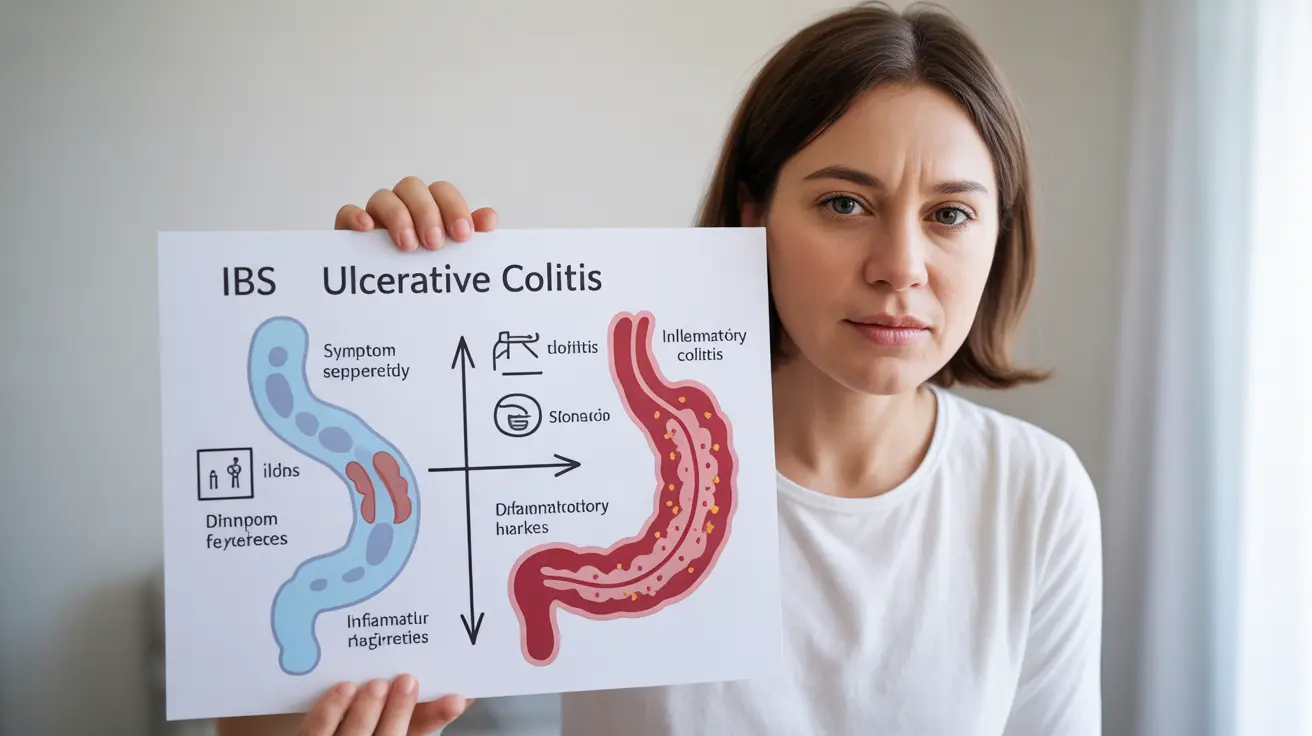Living with digestive issues can be challenging, especially when trying to determine whether symptoms point to irritable bowel syndrome (IBS) or ulcerative colitis. While these conditions may share some similar symptoms, they are distinctly different disorders requiring specific approaches to diagnosis and treatment.
Understanding the key differences between IBS and ulcerative colitis is crucial for proper medical care and management. This comprehensive guide will help you understand how these conditions differ, their unique characteristics, and the various treatment options available.
Key Differences in Symptoms and Disease Nature
IBS and ulcerative colitis present with notably different symptoms and underlying causes. IBS is a functional disorder affecting the gut-brain interaction, while ulcerative colitis is an inflammatory bowel disease (IBD) that causes inflammation and ulcers in the digestive tract.
IBS Characteristics
- Abdominal pain that typically improves after bowel movements
- Changes in bowel habits without visible inflammation
- No blood in stools (unless from hemorrhoids)
- Symptoms that often worsen with stress
- No visible damage to the intestinal lining
Ulcerative Colitis Characteristics
- Bloody diarrhea
- Visible inflammation in the colon
- Abdominal pain that may not improve after bowel movements
- Weight loss and fatigue
- Possible fever during flare-ups
Diagnostic Processes and Testing
The diagnostic approach differs significantly between these conditions. While IBS is typically diagnosed through symptom evaluation and ruling out other conditions, ulcerative colitis requires more extensive testing.
Diagnosing IBS
- Symptom assessment using Rome criteria
- Physical examination
- Limited blood tests
- Possible stool tests to rule out infection
- No invasive testing required unless red flags present
Diagnosing Ulcerative Colitis
- Comprehensive blood tests
- Stool samples
- Colonoscopy with biopsy
- Imaging studies (CT scan or MRI)
- Regular monitoring of disease progression
Treatment Approaches and Management
Treatment strategies vary significantly between IBS and ulcerative colitis, reflecting their different underlying causes and nature.
IBS Management Strategies
- Dietary modifications and trigger food identification
- Stress management techniques
- Over-the-counter antidiarrheal medications
- Prescription medications for specific symptoms
- Probiotics and fiber supplements as needed
Ulcerative Colitis Treatment
- Anti-inflammatory medications
- Immunosuppressive drugs
- Biologics
- Careful monitoring of nutrition
- Possible surgery in severe cases
Long-term Outlook and Complications
The potential complications and long-term outlook differ significantly between these conditions. While IBS can significantly impact quality of life, it doesn't cause permanent damage to the digestive system. Ulcerative colitis, however, can lead to serious complications if not properly managed.
Frequently Asked Questions
What are the main symptoms that help distinguish irritable bowel syndrome (IBS) from ulcerative colitis?
The key distinguishing symptoms are the presence of blood in stools and inflammation in ulcerative colitis, which are not present in IBS. IBS symptoms typically improve after bowel movements, while ulcerative colitis symptoms may persist.
How do doctors diagnose the difference between IBS and ulcerative colitis?
Doctors diagnose IBS primarily through symptom evaluation and ruling out other conditions. Ulcerative colitis requires more extensive testing, including colonoscopy, blood tests, and imaging studies.
Can ulcerative colitis cause complications that IBS does not, such as colon cancer risk?
Yes, ulcerative colitis can lead to serious complications, including an increased risk of colon cancer, while IBS does not cause permanent damage or increase cancer risk.
What are the treatment options for managing symptoms of IBS versus ulcerative colitis?
IBS treatment focuses on symptom management through diet, stress reduction, and specific medications. Ulcerative colitis requires more aggressive treatment with anti-inflammatory medications, immunosuppressants, and possibly surgery.
Is it possible to have both IBS and ulcerative colitis at the same time, and how does that affect treatment?
Yes, it's possible to have both conditions simultaneously. Treatment must address both conditions, with priority given to managing the ulcerative colitis while incorporating IBS management strategies as appropriate.




